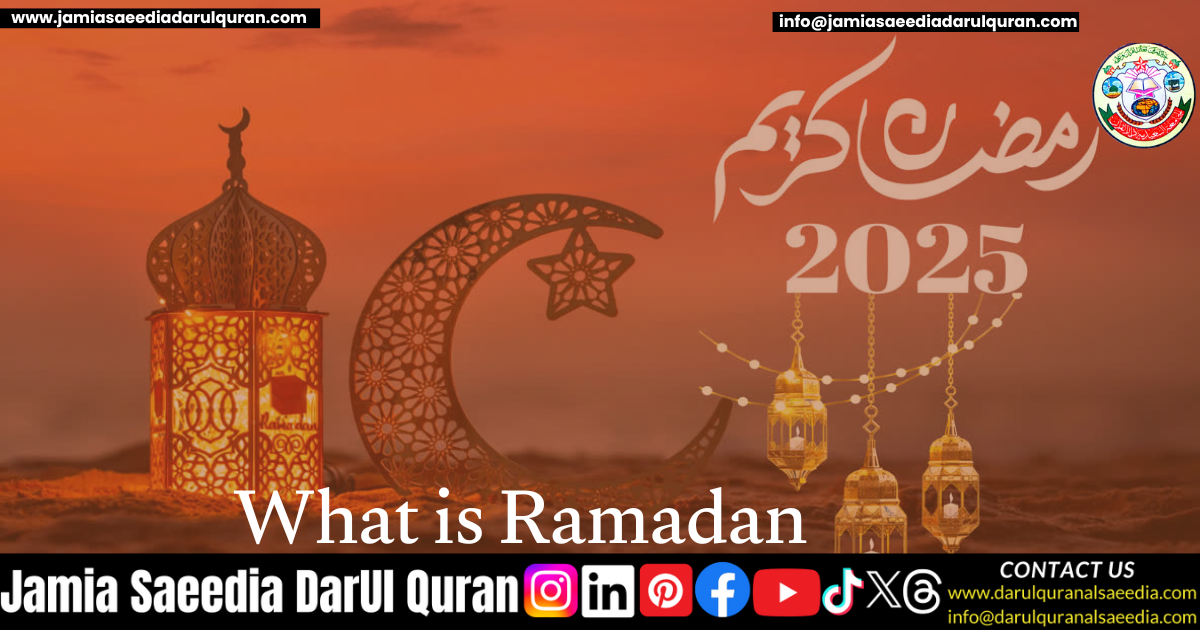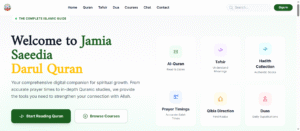What is Ramadan? is the ninth month of the Islamic calendar, observed by Muslims worldwide as a month of fasting, reflection, and spiritual growth. It is a time to abstain from food, drink, and impure thoughts from sunrise (Fajr) to sunset, focusing instead on prayer and connecting with Allah (SWT).
The Significance of Fasting
Fasting during Ramadan is one of the Five Pillars of Islam, obligatory for all able Muslims. It serves multiple purposes:
Read More: The Joy of Ramadan
- Spiritual Connection: Fasting deepens the connection with Allah (SWT) and is a form of worship.
- Empathy and Gratitude: It allows individuals to understand the suffering of those in poverty and famine, fostering gratitude for life’s blessings.
- Self-Discipline: Fasting teaches patience, self-control, and compassion for others.
The Five Pillars of Islam
The Five Pillars are the core practices that all Muslims should follow:
- Shahadah: The profession of the Islamic faith.
- Salah: Five daily prayers and ritual cleansing (wudu).
- Zakat: Charity based on one’s wealth to help the less fortunate. Donations during Ramadan are highly rewarded.
- Sawm: Fasting during Ramadan, expected of those in good health.
- Hajj: The pilgrimage to Mecca, to be undertaken at least once in a lifetime by able-bodied Muslims.
What is Ramadan in the UK?
The dates of Ramadan change annually due to the lunar calendar, rotating by approximately 10-11 days each year. The exact dates depend on the sighting of the moon.
Eid al-Fitr
Eid al-Fitr marks the end of Ramadan and is celebrated with feasting and joy. Muslims pay their Zakat before Eid prayers, wear their best clothes, and gather with family and friends. Children often receive gifts or money.
Zakat and Ramadan Donations
Zakat is an obligatory act of charity, the third pillar of Islam. Donating during Ramadan is highly rewarded, as it brings untold blessings and rewards for the donor. Zakat is calculated at 2.5% of total wealth above the nisab value, which includes:
- Gold and silver
- Cash and bank accounts
- Pensions
- Investment property
- Stocks and shares
- Money lent out
- Business stock
- Agriculture produce
Wealth must be maintained for one lunar year before Zakat is paid.
Your Donations Matter
Donations during Ramadan provide life-saving and life-changing relief to thousands of people annually. By giving Zakat, Muslims share their blessings in the name of Allah (SWT), benefiting both the recipients and the donors.
What is Ramadan in Islam?
Ramadan is the ninth month of the Islamic calendar and is observed by Muslims worldwide as a month of fasting, prayer, reflection, and community. It is one of the Five Pillars of Islam, which are the core practices that Muslims are obligated to follow. During Ramadan, Muslims abstain from food, drink, and impure thoughts from dawn (Fajr) until sunset (Maghrib). The purpose of fasting is to deepen one’s connection with Allah (SWT), learn self-restraint, and cultivate empathy for those who are less fortunate. Ramadan is also a time for increased charity, spiritual growth, and seeking forgiveness.
What Month is Ramadan?
Ramadan is the ninth month of the Islamic lunar calendar, which is based on the phases of the moon. The Islamic calendar is approximately 10-11 days shorter than the Gregorian calendar, so the dates of Ramadan shift each year. The exact start and end dates of Ramadan are determined by the sighting of the new moon, which can vary slightly depending on location and atmospheric conditions. Once the new moon is sighted, Ramadan begins, and it lasts for 29 or 30 days.
Ramadan Fasting
Fasting during Ramadan, known as Sawm, is one of the Five Pillars of Islam. It involves abstaining from food, drink, and impure thoughts from dawn until sunset. The fast begins with the pre-dawn meal (Suhoor) and ends with the sunset meal (Iftar). The primary goals of fasting are:
- Spiritual Connection: Deepen one’s relationship with Allah (SWT) through increased worship and reflection.
- Self-Discipline: Develop self-control and patience.
- Empathy: Understand the struggles of those who are less fortunate and cultivate gratitude for one’s blessings.
- Purification: Cleanse the body and soul from impurities and bad habits.
Ramadan Mubarak
“Ramadan Mubarak” is a greeting exchanged among Muslims during Ramadan, wishing each other a blessed and happy Ramadan. It is a way to express goodwill and celebrate the holy month together. The phrase can be used throughout Ramadan and is often accompanied by wishes for acceptance of fasts, prayers, and good deeds. It is a time to strengthen bonds with family, friends, and the community, fostering a sense of unity and shared purpose.
How Long is Ramadan?
Ramadan lasts for 29 or 30 days, depending on the sighting of the new moon. The Islamic calendar is lunar-based, and each month begins with the sighting of the new crescent moon. The exact duration of Ramadan is confirmed by religious authorities or moon-sighting committees, who announce the start and end of the month based on astronomical calculations or physical sightings. The fasting period ends with the celebration of Eid al-Fitr, which marks the beginning of the next lunar month, Shawwal.
Conclusion:
Ramadan is a sacred month that offers Muslims the opportunity to deepen their faith, practice self-discipline, and cultivate empathy for those less fortunate. Through fasting, prayer, and charitable acts, Muslims seek to strengthen their connection with Allah (SWT) and grow spiritually. The celebration of Eid al-Fitr marks the culmination of this spiritual journey, emphasizing the values of community, generosity, and gratitude.
Read More: روزہ کیا ہے
FAQs:
Q: Why do Muslims fast during Ramadan?
A: Muslims fast during Ramadan as it is one of the Five Pillars of Islam, commanded by Allah to learn self-restraint and grow spiritually.
Q: What is the significance of Ramadan?
A: Ramadan is significant as it is the month in which the Quran was revealed. It is a time for spiritual reflection, self-improvement, and seeking forgiveness.
Q: How long do Muslims fast each day during Ramadan?
A: Muslims fast from dawn (Fajr) until sunset (Maghrib) each day during Ramadan.
Q: What is Suhoor and Iftar?
A: Suhoor is the pre-dawn meal consumed before fasting, and Iftar is the meal that breaks the fast at sunset.
Q: What is the purpose of Tarawih prayers?
A: Tarawih prayers are special night prayers performed during Ramadan, where long portions of the Quran are recited.
Q: What is Laylat al-Qadr?
A: Laylat al-Qadr, or the Night of Power, is one of the last ten nights of Ramadan, believed to be better than a thousand months.
Q: Why is charity important during Ramadan?
A: Charity is important during Ramadan as it is a time to be generous and help those in need, following the example of the Prophet (PBUH).
Q: What is Zakat al-Fitr?
A: Zakat al-Fitr is a charity given at the end of Ramadan to help the poor celebrate Eid al-Fitr.
Q: How does Ramadan end?
A: Ramadan ends with the celebration of Eid al-Fitr, the Festival of Breaking the Fast.
Q: What are some common foods eaten during Ramadan?
A: Common foods include dates, fruits, and traditional dishes that vary by region.
Q: How do Muslims maintain their energy during fasting?
A: Muslims maintain energy by eating nutritious meals during Suhoor and Iftar and staying hydrated.
Q: What is the significance of the moon in Ramadan?
A: The moon is used to determine the start and end of Ramadan, with the new moon signaling the beginning of the month.
Q: How do children participate in Ramadan?
A: Children may fast for shorter periods or participate in other Ramadan activities to learn about the significance of the month.
Q: What is the role of the community during Ramadan?
A: The community plays a vital role by supporting each other, sharing meals, and praying together.
Q: How do Muslims stay focused on their faith during Ramadan?
A: Muslims stay focused by engaging in regular prayers, reciting the Quran, and reflecting on their actions.
Q: What is the importance of family during Ramadan?
A: Family is important as Ramadan is a time to strengthen bonds and share the blessings of the month together.
Q: How do Muslims celebrate Eid al-Fitr?
A: Eid al-Fitr is celebrated with special prayers, family gatherings, gift-giving, and feasting.
Q: What are some challenges Muslims face during Ramadan?
A: Challenges include maintaining energy, balancing work and fasting, and resisting temptations.
Q: How do non-Muslims support Muslims during Ramadan?
A: Non-Muslims can support by being respectful, accommodating fasting schedules, and participating in Iftar gatherings.
Q: What lessons can be learned from Ramadan?
A: Lessons include self-discipline, empathy for the less fortunate, and the importance of spiritual growth.



Leave A Comment